'Country Life'? Rurality, folk music, and 'Show of Hands'
Yarwood and Charlton
Journal of Rural Studies
Folk music is: ‘‘collectively owned, of ancient and anonymous authorship and transmitted across generations by word of mouth; a canon celebrating life in the past and urging change for tomorrow, the performance being on simple instruments in natural settings.. the joyful performance by specially gifted but not ‘professional’ musicians’’, (Ennis, 1992, p. 88, quoted in Connell and Gibson, 2003, p. 30).
Another entry in the saga of my study of place and music, this article uses the case study of the folk group "Show of Hands" and how it reflects southwest English rurality. Grooveshark has a few of their albums - I'm listening to them as I write this. One of the absolutely fun things about this research is that it turns up all kinds of cool music to listen to, entire soundscapes I didn't even know existed. This project approaches the sheer enjoyment I had when reading Winnie-the-Pooh and Wind in the Willows for a paper I wrote on Daoism (which is in the archives of this blog, if you want to read it).
Some of the salient points from this article:
rural music represents the lives, grievances, and celebrations of peoples in the particular localities
folk music is constantly evolving, a hybrid, not separatable from current influences
folk revival sometimes is more about inventing a past than preserving it
music can only be understood by taking account of conditions of production, form of the song, readings, society and impacts
music can play an important role in transcending the limitations of our own place in the world, of constructing trajectories across space
music helps people 'become' something beyond their assigned dominant identities - to join 'others' via music
regions and regional identities are porous
"realistic portrayal" of folk like is not as important as providing a "complex, shifting, and hybrid view of reality"
Another neat idea, which I deeply appreciate, was found in the admission of the authors that they were analyzing lyrics because they were geographers trained in textual analysis - it's the "go with what you know" principle. They noted that if they were music theorists they could have undertaken an aural analysis, but they weren't so they didn't. What is my niche? What unique analysis can I bring to the table, based on my background?
Also, getting away from the idea of worrying about what is "realistic" or "authentic" and focusing more on how music describes the complexities of how the creators and performers view reality is a much more interesting and vibrant way to analyze a place or a people. Instead of worrying about the "Tibetan-ness" of the music in Bylakuppe, why not shift focus a little bit to the "Bylakuppe-ness" of the music, and how this contributes not only to the Tibetan identity of the refugees, but to the "Tibetan-refugee-in-Bylakuppe" identity of the community. I still have to continue in the vein of becoming conversant with Tibetan music from the motherland, because it is fascinating and because it is what the Bylakuppeans are likely to have in their heads when they evoke the sound of their heritage. But I don't have to worry so much about "finding" an "authentic" version of Tibet in Bylakuppe, and that would be deceiving anyway, instead I can choose to look with open eyes at the current situation.

No comments:
Post a Comment